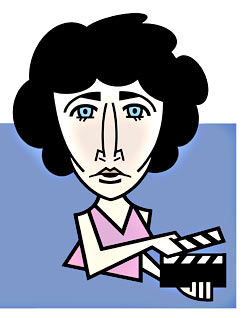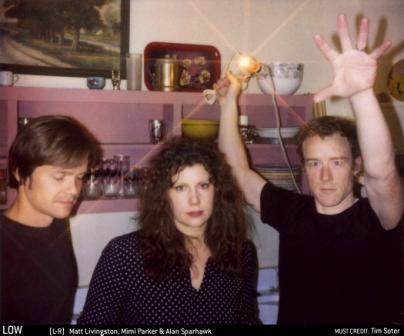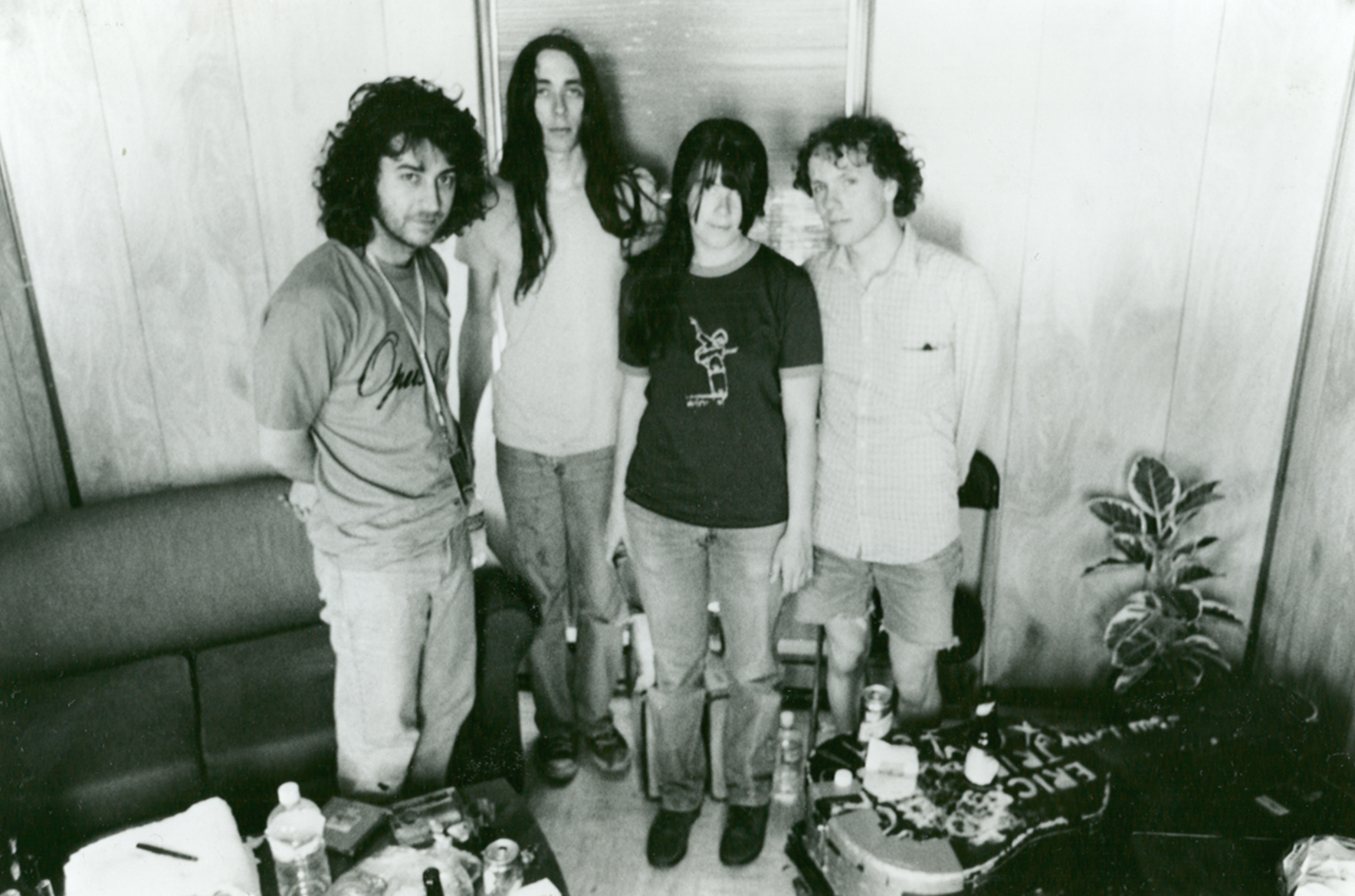“If you really love me, then let’s make a vow, right here, together, right now, OK? OK. All right, repeat after me. I’m gonna be free. I’m gonna be free. I’m gonna be brave. I’m gonna be brave. Good. I’m gonna live each day as if it were my last. Oh, that’s good. You like that? Yeah. Say it. I’m gonna live each day as if it were my last. Fantastically. Fantastically. Courageously. Courageously. With Grace. With Grace.“
The opening dialogue in Miranda July’s film Me and You and Everyone We Know is beautiful. It’s also exchanged between two bedroom slippers, as the film’s central character, an artist named Christine (played by July), videotapes from above. As concept-within-concept, as voyeurism on a platter, it’s charming and also childish and slightly embarrassing. It sets the mood for July’s most visible work to date, which since its release has been so praised that only assholes like me would dare call it precious.
Nevertheless, Miranda July deserves the popular and critical respect she’s receiving, the start of a return on years of unique creative work. The L.A.–based multimedia artist, who hasn’t worked a day job in a decade, has worked in myriad mediums: live performance, spoken word, music (with the Need in Portland in the ’90s), underground films and 2005’s Camera d’Or–winning Me and You, fiction, and acting. Her daunting and frequently brilliant output is offset by a disarmingly modest persona. The press photo accompanying her new short-story collection, No One Belongs Here More Than You, shows her mildly stunned/scared/annoyed, and you wonder, why the pose? Over and over we see that July revels in personalities and the mundane details of life: hers, yours, and everyone else’s. Her artistic attitude toward people is so warmly inquisitive, but this blank stare doesn’t find “us” in it together. Instead, it resurrects the wall between artist and consumer, and keeps us at a distance.
Perhaps it’s different when you’re in front of her. I wouldn’t know—an hour before her reading from the aforementioned book at Neumo’s this May, at least three people texted with: “Don’t bother.” The place had long since reached capacity. Would it be a misty-eyed fan scene along the lines of Regina Spektor’s or Feist’s most recent performances here, with audiences hanging on every aside, laughing at every self-conscious joke? Would it be worth the hype? I’d be less annoyed if more people were moved not just to praise but to produce as well. July is extraordinary at revealing the beauty of the ordinary, and every move she makes seems to encourage the everyperson, “You can be, too.” Have you been studying up? Test your knowledge of our favorite Renaissance woman and her work.
1. Miranda July and Harrell Fletcher’s installation Learning to Love You More (a version of which was shown at the 2004 Whitney Biennial) is based on a Web site of the same name, which provides “assignments” for people to complete and snail-mail in. For Bumbershoot, Seattle family the Olivers (oliverlove.blogspot.com) document 63 assignments. Which of these is not one of them?
A. Draw Raymond Carver’s Cathedral.
B. Write the story of your grandparents’ courtship.
C. Give advice to yourself in the past.
D. Spend time with a dying person.
E. Hang a wind chime on a tree in a parking lot.
2. Which of these quotes regarding No One Belongs Here More Than You was written by staff at Elliott Bay?
A. “These delightful stories…skip past the quotidian, the merely real, to the essential, and do so with a spirit of tenderness and wonder that is wholly unique.”
B. “These stories are as immediate and distressing as confessionals.”
C. “July gives the most seemingly insignificant moments a sly potency.”
3. Which scenario did not take place in Me and You and Everyone We Know?
A.A gallerist unknowingly arranges a sexual rendezvous with a 7-year-old.
B. A man sets his hand ablaze in front of his children.
C. July gives her love interest, Richard, a goldfish.
D. Two teenage girls practice giving head on their neighbor.
4. Choose the person with whom July has not been romantically involved.
a. Director Spike Jonze
b. K Records impresario Calvin Johnson
c.Need bandmate/Peaches keytarist Radio Sloan
d.Graphic designer/filmmaker Mike Mills
5. Which sentence is from “Making Love in 2003,” in No One Belongs Here More Than You?
a. “Making love to him was like going through a car wash, except you came out dirtier and more alive at the other end.”
b. “I love you as certain dark things are loved, secretly, between the shadow and the soul.”
c. “He felt a funny bone-twinge as he realized how her body, her voice, her every fussy gesture had become part of a Jane network, a world of smells, sounds and touches that found its most acute focus when she had her legs around his back.”
d. “When you reach a certain saturation point, lovemaking becomes one endless vibration.”
6. What does this ASCII represent? ))((
a. A whisper
b. “Back and forth, forever”
c. A vagina
d. “Bootylicious”
7. What classic of youthful angst did other Amazon customers who bought No One also buy?
a. Girl by Blake Nelson
b. The Perks of Being a Wallflower by Stephen Chbosky
c. Catcher in the Rye by J.D. Salinger
8. In which music video does July perform 227 poses, one per second?
a. Blonde Redhead’s “Top Ranking”
b. Sleater-Kinney’s “Get Up”
c. The Gossip’s “Standing in the Way of Control”
9. Which of July’s performance pieces included elements of audience participation?
a. Love Diamond (1998–2000)
b. The Swan Tool (2000–2002)
c. How I Learned to Draw (2002–2003)
d. Things We Don’t Understand and Are Definitely Not Going to Talk About (2006–present)
10. Match the film critic with their quote regarding Me and You.
a. “Everyone’s groping toward a shape or truth to their lives. And though their plans are sometimes silly and their efforts bungling, July invites us to laugh without mockery or hipster condescension.”
b. “Quite possibly the single most pretentious movie ever made.”
c. “[It] is a film that with quiet confidence creates a fragile magic. It’s a comedy about falling in love when, for you, love requires someone who speaks your rare emotional language.”
d. “…[I]ts wide-eyed, quizzical approach to the world can seem almost naïve. But this guilelessness—which will either charm you or drive you up the wall—is more a calculated effect than the simple expression of a whimsical sensibility.”
e. “It’s a moonbeam romance laced with startling wit and gravity.”
Roger Ebert, The Chicago Sun-Times
A. O. Scott, The New York Times
Peter Travers, Rolling Stone
Brian Miller, Seattle Weekly
“Steven F.,” metacritic.com user








